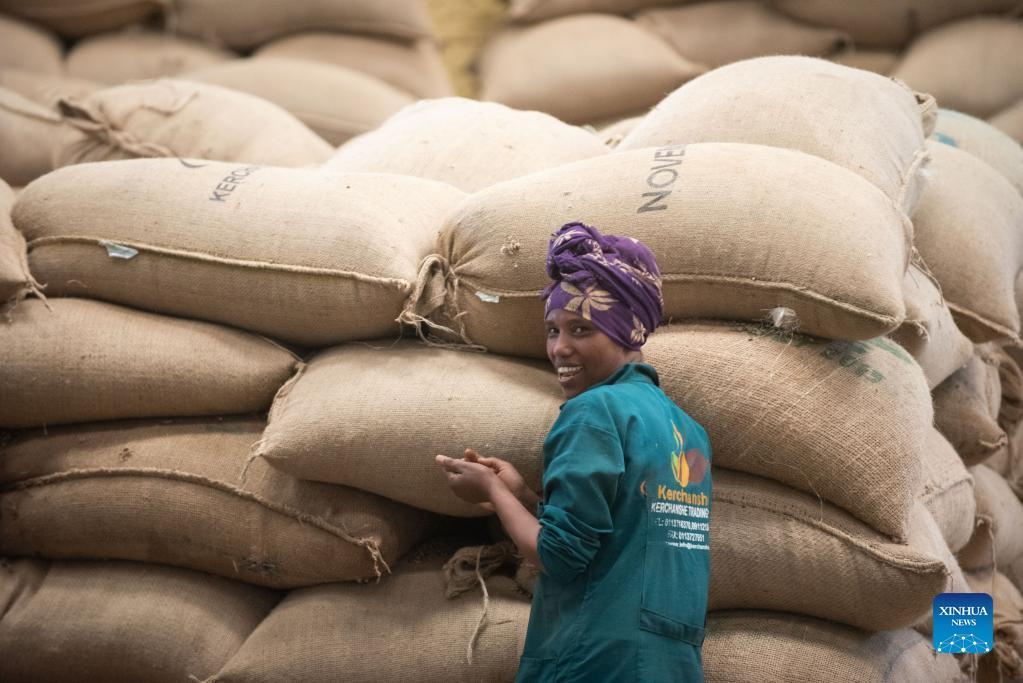Feature: Ethiopian coffee garners popularity among Chinese consumers

An employee works at a coffee processing plant in Addis Ababa, Ethiopia, Oct. 21, 2021. The increasing number of consumers and growing popularity of Ethiopia's coffee among the Chinese people is propelling Ethiopia's coffee export market, officials and coffee exporters said. (Xinhua/Michael Tewelde)
ADDIS ABABA, Sept. 26 (Xinhua) -- The increasing number of consumers and growing popularity of Ethiopia's coffee among the Chinese people is propelling Ethiopia's coffee export market, officials and coffee exporters said.
"Currently, the youth in China are really fond of Ethiopian coffee and we are witnessing growing coffee market share in China and other parts of Asia," Adugna Debela, director general of the Ethiopian Coffee and Tea Authority (ECTA), said in a recent interview with Xinhua.
Figures from ECTA showed that Ethiopia exported 11,935.65 metric tons of coffee to China during the last Ethiopian fiscal year which ended on July 7, earning 65.31 million U.S. dollars, up by 84 percent year on year.
The increase has made China the seventh major importer of Ethiopian coffee last fiscal year (July 8, 2021-July 7, 2022), up from 33rd in the previous fiscal year (July 8, 2020-July 7, 2021)
Ethiopia obtained a record 1.4 billion U.S. dollars from exporting over 300,000 metric tons of coffee last Ethiopian fiscal year. The top five export destinations were Germany, the U.S., Saudi Arabia, Belgium and Japan.
Debela argued that China would be one of the main destinations for Ethiopian coffee due to its population size and the growing coffee drinking habits among the people.
"Very recently, countries like China, Pakistan and the United Arab Emirates are coming to the front line, after consumers in those countries tested and proved that Ethiopian coffee is an organic one," Debela said.
Amid the growing demand for Ethiopian coffee in the Chinese coffee market, a growing number of Ethiopian coffee growers and exporters are vying to penetrate the emerging Chinese coffee market.
Israel Degefa, Chief Executive Officer of Kerchanshe Trading, the largest producer and exporter of coffee in Ethiopia, shares the idea of the director general and anticipates "China would be one of the main destinations for Ethiopian coffee in the near future."
"In general, the Chinese market is growing every year and we are tripling our export to China both in volume of coffee and value. The demand is high and we are preparing to grow more coffee to feed the Chinese market," Degefa said.
Ethiopia, which is known as the origin of Arabica coffee, is recognized worldwide for its rich coffee quality, variety of flavors and aroma, making the demand for the commodity increase globally.
For Degefa, the rising demand for Ethiopian coffee in China has to do with a cultural shift. "I think there is a cultural shift among the Chinese people. The Chinese new generation is adapting to drink tea and coffee concurrently," Degefa said.
Temesgen Cherkos, export manager of Hadeed Trading Private Limited Company, said his company is making increasing shipments of coffee to China, attributing the rise in the volume of coffee export to growing coffee drinking habits in China.
"We have been sending coffee to China for two years now. We exported a small volume of coffee the previous year but this year, after we got registered in China, we are exporting an increasing volume of coffee to China. At least we make shipments of 10 containers of coffee to China every month," he said.
There are about 5 million coffee growers in Ethiopia and more than 25 million people in the country depend on coffee production and processing for their livelihood. Also coffee accounts for up to 30 percent of Ethiopia's export revenue, according to ECTA.
However, figures from the ECTA show that only 12 percent of Ethiopian coffee export commands the highest price in the international coffee market due to lack of using modern technology and the best variety of species in the production and processing of coffee.
According to ECTA, coffee Arabica is highly vulnerable to changing climatic conditions, especially the desert weather which is posing a potential threat to coffee production.

Employees work with coffee beans at a coffee processing plant in Addis Ababa, Ethiopia, Oct. 21, 2021. The increasing number of consumers and growing popularity of Ethiopia's coffee among the Chinese people is propelling Ethiopia's coffee export market, officials and coffee exporters said. (Xinhua/Michael Tewelde)
Photos
Related Stories
Copyright © 2022 People's Daily Online. All Rights Reserved.









